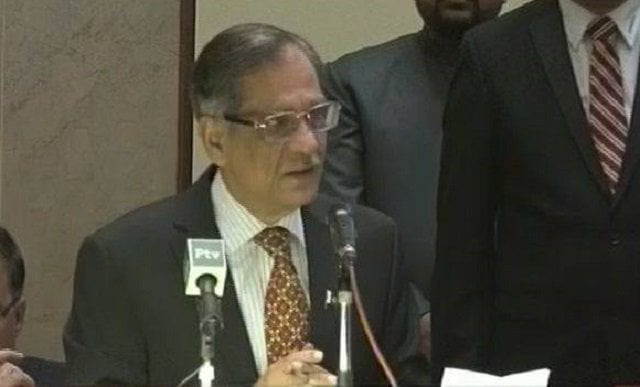Ex-ETPB chairman accuses CJP of ‘pre-deciding’ case
Review petition seeks setting aside January 31 order

Chief Justice of Pakistan Mian Saqib Nisar. PHOTO: FILE
Farooq, while referring to the Supreme Court’s proceedings of January 19, alleged that the chief justice has maligned him by giving certain remarks against him.
“Such derogatory remarks are sufficient proof that you (CJP) have violated Quranic injunctions while in your capacity as chief justice of Pakistan,” says the review petition, filed through Ikram Chaudhry advocate.
The petitioner, while reproducing certain remarks of the chief justice against him, said that the words uttered by him (the chief justice) also prove that he had pre-decided the case without listening to his arguments for some unknown grudge.
He, while citing verses of the Holy Quran, also stated that command of the Almighty demands that he (CJP) should repent; otherwise, he would be liable to be tried ‘in the light of the Islamic injunctions’.
“The petitioner (Siddiqul Farooq) has an applaudable background and standing, no nepotism can be seen in his appointment as he was appointed as managing director of the HBFC 1998-99 by the chief executive of the country (Nawaz Sharif) – the same chief executive who appointed Justice Mian Saqib Nisar as federal secretary of law in March 1997, as later [he] elevated him as a judge of the Lahore High Court in 1998.
“It was because of the competence of Justice Saqib Nisar that he was elevated to such post and not political consideration or nepotism (though he used to attend the PML-N secretariat to serve the cause of the PML-N under the leadership of Muhammad Nawaz Sharif, the then president of the PML-N and leader of the opposition in the National Assembly).
“For the same reasons and owing to the petitioner’s capabilities, he was first appointed as managing director of the HBFC and later chairman of the ETPB on merit keeping in view of my capabilities. It is a settled principle of justice that same rule/reasoning apply to two different people in a similar situation. That is the case of the petitioner which was ignored by the Supreme Court, extending baseless allegations,” says the petition
He contends that the quo warranto petition regarding his appointment was already pending in the Lahore High Court.
The Supreme Court on December 13 directed the high court to decide the case expeditiously by a division bench within one week, but the Supreme Court in its January 31 order during hearing of suo motu in the Katas Raj case de-notified him as ETPB chairman.
“This instance of gross illegality, miscarriage of justice, by passing an earlier order on December 13, 2017 was assuming the jurisdiction of the high court, which was seized of the matter at Lahore.”
The petitioner says that he was appointed under the act of parliament, adding that at that time, there were no rules for the appointment as such.
“The rules, which have been notified on January 31, were framed on the direction of the Lahore High Court chief justice, but these rules have not been approved by the cabinet so far; therefore, his appointment can only be examined in view of the Parliament Act 1975.”
It is also contended that assistant commissioners, deputy commissioners, revenue officers, members of customs, etc., also hold qausi-judicial courts, adding that even those officers have no legal background and experience.
The petitioner contends that the court had de-notified him on the ground which is against the norms and natural justice, and amounts to victimisation. It also contended that the Supreme Court erred in examining the Act of 197; therefore, the order needs to be reviewed.
The petitioner prayed the Supreme Court accept his review petition and set aside the January 31 order in the interest of justice and fair play.


















COMMENTS
Comments are moderated and generally will be posted if they are on-topic and not abusive.
For more information, please see our Comments FAQ